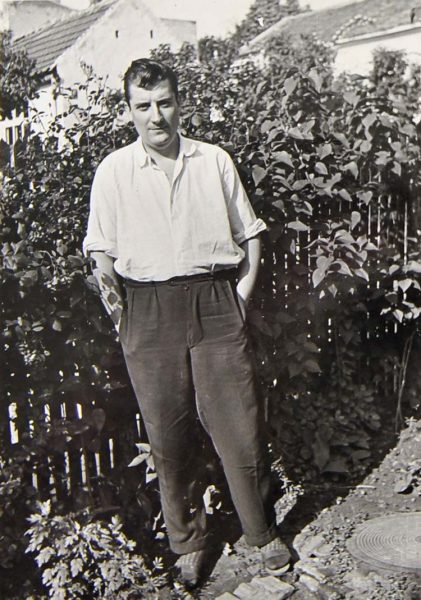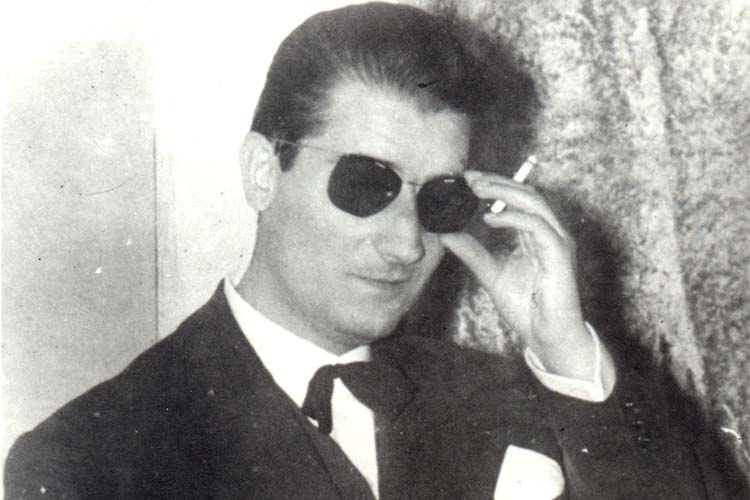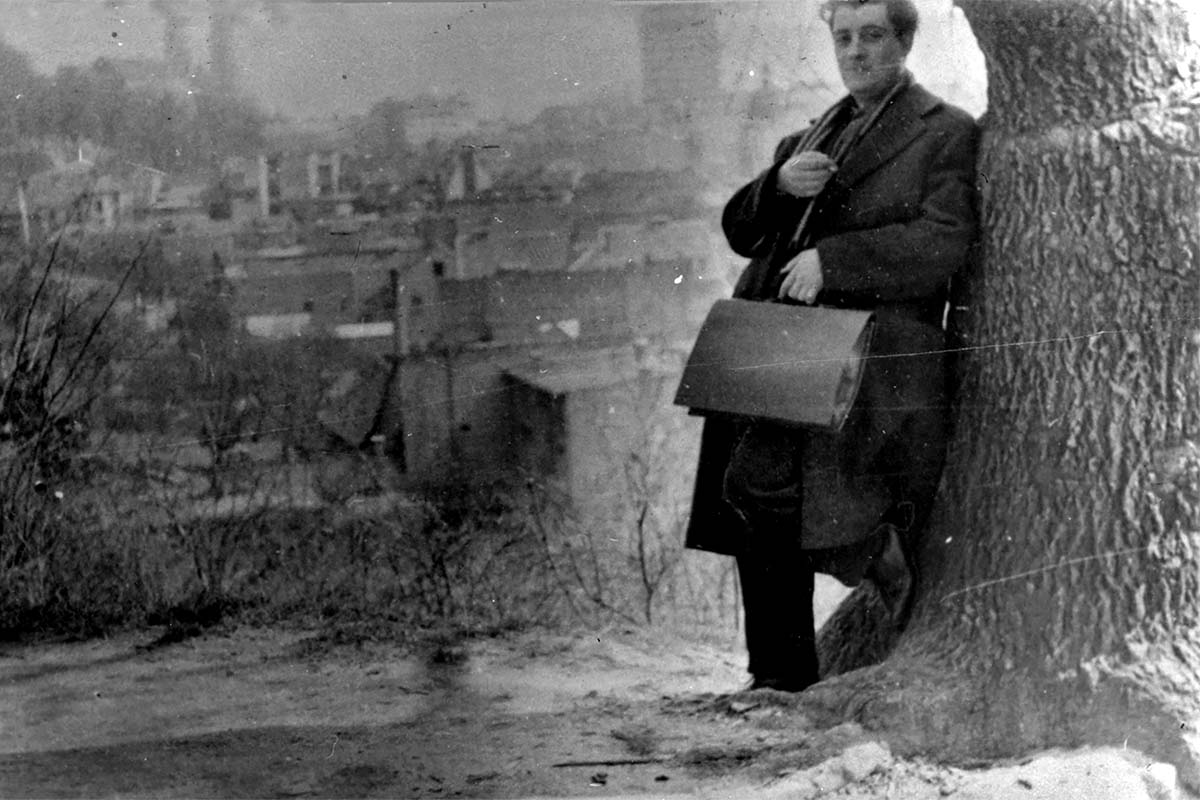If he were alive today, prince of poets Branko Miljković would have turned 90 at the end of January. Still, the end of his life story came – as he’d predicted in his poetry – when he was just 27, on the outskirts of Zagreb. An alleged suicide that was actually most likely staged, and has never been brought to light, marked the end of a young life and a fledgling literary career. But his poetry remained. And it would be written about by everyone – as was stated, again prophetically, by Miljković himself
He left behind a double legacy. First and foremost is his work, which remains insufficiently elucidated, given that those who interpreted his poetry bound themselves to the wrong elements, while skimming over the important and essential. There is no doubt that he is among our all-time greatest poets. The other aspect of his legacy is reflected in the myth about him, the legend of an anguished poet and someone who goes all the way, spitting in the face of death and laughing as he does so; about someone who embodies the poet from head to toe, and Branko was poetry itself…
There is much about him that fascinates. However, in the whole story about his poetry and philosophy, and about the mystification of Miljković’s life and death, his humanitarianism was overlooked. Branko really loved people and had a particular understanding for those who were marginalised and impoverished. There is his great poem Rudari [Miners], in which he writes: “They descended to hell for injustice. On which one can warm oneself.” This poem remains painfully relevant today, more than half a century on.

As an extremely intuitive man, he was able to see through all the imitations of the system, its shortcomings and duplicity, and as a cantankerous native of Niš, he didn’t hesitate to speak about that, clearly and loudly. That wasn’t really something that was liked by his comrades “from above”. His question “why do they kill poets in socialism?” continues to resonate. To say that at a time when saying much less could result in one being confined to prison or Goli Otok for many years, or facing something even worse, was an act of hitherto unseen courage bordering on lunacy. Quite simply, Miljković was bothersome the most because he didn’t back down and he feared nobody. Even when he realised that he had become a target of many, from the powerful to the envious, his defiance continued.
The chorus of the Bijelo Dugme song Pljuni I zapjevaj [Spit and Sing] includes a famous line by Branko: “He who cannot listen to song shall be listening to storms”. Then there was the only award ever won by the band Šarlo Akrobata that was called the “Courageous Flower”, again after one of Branko’s poems. Niš-based band Stereo Banana last year released its album Niš Passions [Niške Strasti] that includes the song The Death of Branko Miljković. There are several music projects that combine rock music and Miljković’s verses. And this actually testifies to the vivacity and timelessness of Branko’s poetry. When you read his verses, you don’t get the impression that they were written more than half a century ago, rather it seems that they were written just this morning. There are few such poets among our people. They are so rare that they can be counted on the fingers: Vasko Popa, Mika Antić, Branimir “Johnny” Štulić…
He was a very complex individual who was characterised, already in his early years, by everything that characterises geniuses. So, he had an incredible thirst for knowledge, was constantly wondering about the meaning of the world and life, as well as working constantly on himself. Branko was incredibly erudite, well-read, educated, a polyglot… One could say that he was everything that the majority of contemporary Serbian writers aren’t. He could mount a competent argument on a wide range of topics, which was why he often found himself clashing with the authorities. And that’s another quality of geniuses – they don’t submit to authority.
His question “why do they kill poets in socialism?” continues to resonate. To say that at a time when saying much less could result in one being confined to prison or Goli Otok for many years, or facing something even worse, was an act of hitherto unseen courage bordering on lunacy
One of his most famous poems, “In Vain Do I Wake Her”, has for decades been interpreted by literary theorists, critics, and even poets themselves, but its meaning has somehow eluded everyone who tried to fathom it through verses that were written like some kind of wondrous code.
And behind that poem is a story, a tragic story of wartime Niš.
Specifically, in Branko’s neighbourhood, in that unhappy year of 1944, when the destructive bomber squadrons of our “allies” spewed bombs onto the city on the Nišava, lived a girl named Ruža. She was said to have been an unparalleled beauty. Branko, who was then ten years old, saw Ruža constantly and was probably in love with her, just like the majority of boys from the street. Then came that fateful Easter of 1944, and with it the most devastating bombardment of Niš. Bombs even fell on the Cathedral, with one hitting the altar but not exploding. A divine miracle! But not for the beautiful Ruža, who sustained serious injuries in one of the bombing raids and ended up in a coma.

During the following days, the people of Niš would repeat the same question every day:
“Did Ruža wake up?”
That question, like a mantra or a verse, would become etched in the mind and soul of the ten-year-old Branko.
Ruža never did wake up. And, just a few years later, he would write a poem dedicated to her. “In Vain Do I Wake Her” would be the title of his first collection of poems, which would bring him both fame and enemies in equal measure. Fleeing the evil that he interpreted through his verses, his journey would lead him to Ksaverska Forest in the suburbs of Zagreb.
To this very day, it still hasn’t been clarified whether Branko was killed, on that dark February night, by an excessively powerful word or by someone else.
But the poem continues even when the flame of life has been extinguished.
“In Vain Do I Wake Her” is one of the most beautiful love poems ever recited in the Serbian language. And it has ushered many people into the world of poetry.
That’s how Branko and the beautiful Ruža entered the annals of eternity.
And few people know what stands behind Branko’s verses, what kind of simple yet tragic human story.
Just like Ruža, after departing this world, Branko awoke in some better one, having fallen asleep never to return.
And he was right! People don’t die… They just awaken from this life, as if from a nightmare that’s lasted too long.
Photo: Narodni muzej Niš Legat Branka Miljkovića
